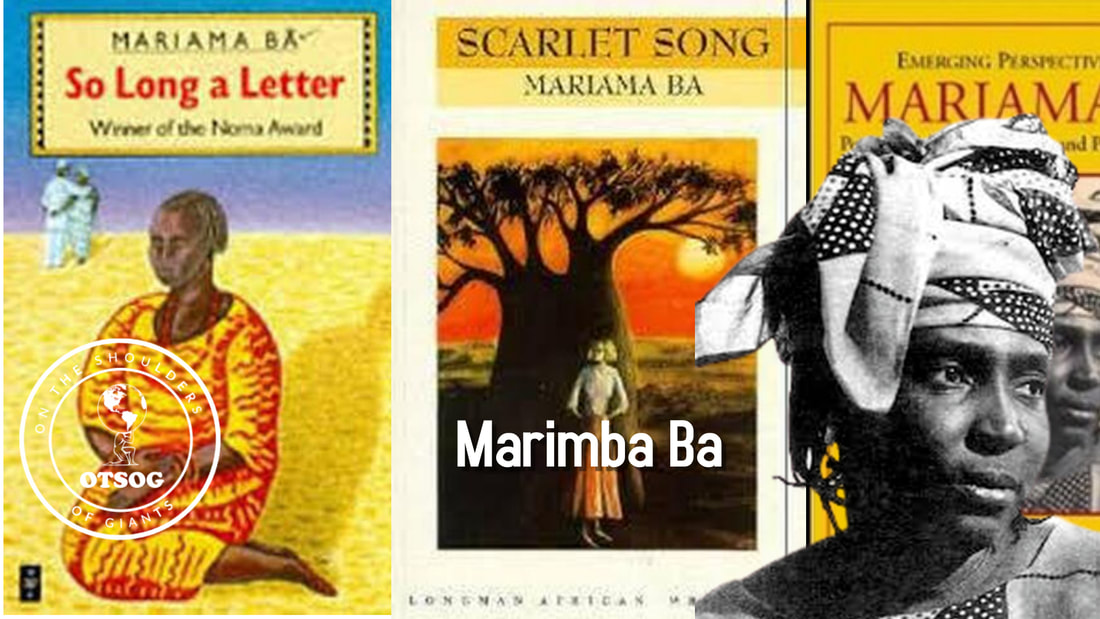|
On April 17th, 1929, Marimba Ba was born in Dakar, Senegal, to parents who were educated and prosperous. Her mother died when she was a young girl, and her father became the Minister of Health for Senegal in 1956, he also worked as a civil servant before becoming the minister of health. Her grandfather was said to be a translator for the French during his time. After the death of her mother, Ba was raised by her father and maternal grandparents who made sure she received an adequate education. She was educated in the French traditions coupled with Quranic teachings; her grandparents made sure she learned Islamic values. Ba was an excellent student who at the age of fourteen earned the highest test scores for her age group. As Ba grew older, her thirst for knowledge and education was being challenged by traditional Islamic culture; her grandparents didn’t believe that a young woman should be educated because of their traditions, but Ba and her father held a different opinion about education. Ba’s father backed her decision to educate herself and helped her enroll in the Ecole Normale, or the Teacher Training College in the city of Rufisque, Senegal. She graduated from the training college in 1947 and became a teacher for twelve years. During her time as a teacher, Ba met and married a man named Obeye Diop. The couple produced nine children before divorcing and Ba becoming a single mother of nine children. Ba’s health started to decline during the latter years of her teaching, so she transitioned her career to become an educational inspector for the Senegalese Regional Inspectorate of Teaching. Ba was regarded as one of Senegal’s most exceptional and prized teachers despite her retiring early from teaching. She was later honored for her teaching in 1977 when a school was founded in her name by Senegal’s President Leopold Senghor. Marimba Ba was a single mother raising nine children and able to provide for her family in a society where the men are usually the primary provider for a family. This was also where Ba’s activism for women’s and human rights began. European neocolonialism was continuously spreading throughout Africa and was a threat to the African nations that were newly independent or developed nations. Ba was at the forefront of the fight against neocolonialism and women’s rights in Senegal. Her next move was publishing her first novel titled So Long A Letter in 1979, which became a critically acclaimed and Noma Award-winning novel. So Long A Letter was a novel that gave a history of the contributions of Senegalese women, it was also a peek into the life of Ba and other women in Senegal, and the challenges they faced to exist as women. She used her novels and community work to help fight discrimination against women, along with fighting the racist practices the French implemented in Senegal. In 1981, Marimba Ba died due to complications with cancer. Her second novel Scarlet Song was published in 1986, and similar to her first novel So Long A Letter, Scarlet Song was also a successful novel that focused on an interracial relationship in a traditional Senegalese society. Ba was just as adamant about restoring Senegalese culture before its French and Islamic influences, as she was about fighting discrimination against the women of Senegal. She was proud of her people and her culture. Ba’s third novel, La Fonction politique des littératures africaines écrites, was focused on encouraging African people to be proud of who they are, where they are from, and their own cultural practices. She was unsatisfied with the way the women were treated, and unsatisfied with the forced influences of the French through colonialism. Marimba Ba is the first woman in Senegal to publish a novel, and it was fitting that her writings challenged the oppressive traditions of Senegal against its women, and even against its men due to colonial influences. Ba experienced hardships and successes. She was supported by her father early in her journey, which helped her to be intentional and fearless in her pursuit of freedom and liberation for her people. Marimba Ba, we proudly stand on your shoulders. J.A. Ward Click here to support the On the Shoulders of Giants book series!!! References: https://en.wikipedia.org/wiki/Mariama_B%C3%A2 https://www.blackpast.org/global-african-history/ba-mariama-1929-1981/ https://www.sahistory.org.za/archive/biography-mariama-ba-lauren-daugherty https://www.historyheroblast.com/historyhero/mariama-ba
0 Comments
Leave a Reply. |
Details
Categories
All
Click Here to join our mailing list
|
Contact Us: |
Connect With Us |
Site powered by PIT Web Design


 RSS Feed
RSS Feed



